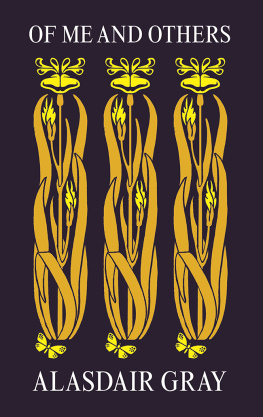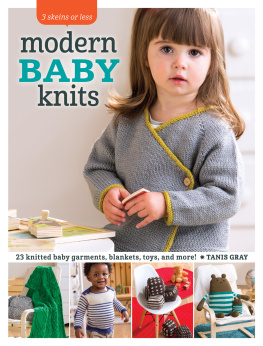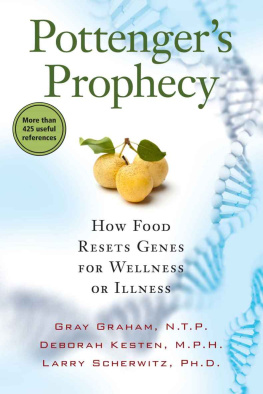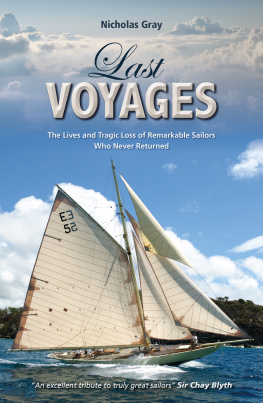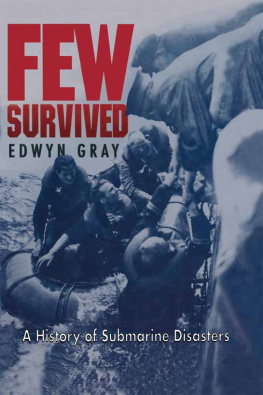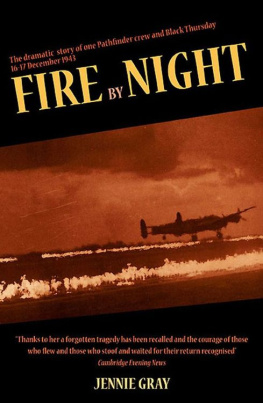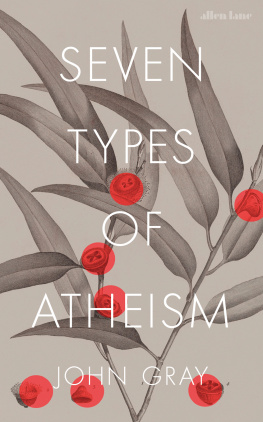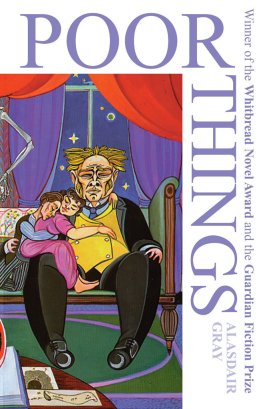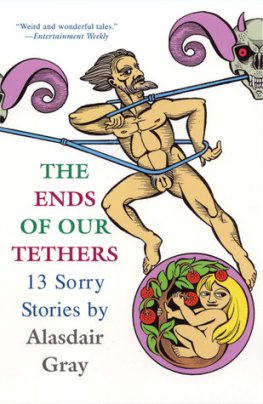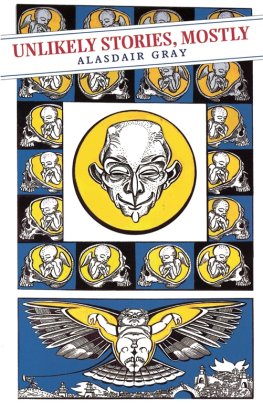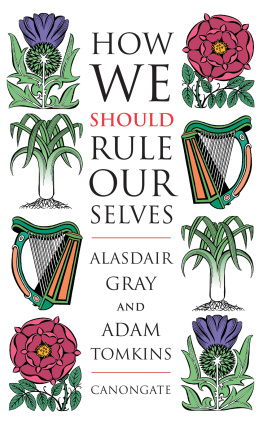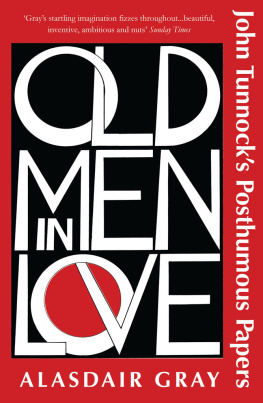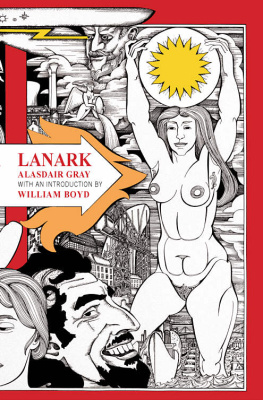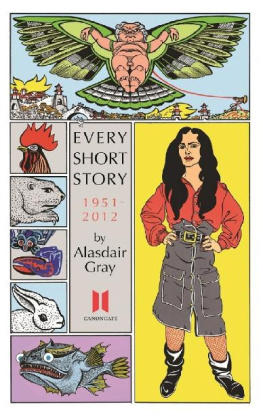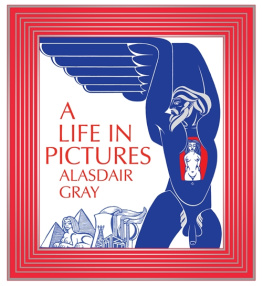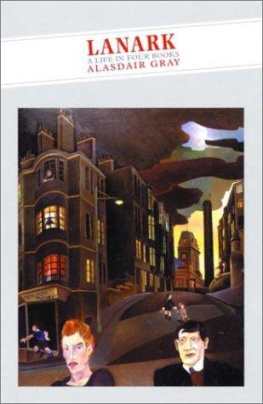OF ME AND OTHERS
Born in 1934, Alasdair Gray graduated in design and mural painting from Glasgow School of Art. Since 1981, when Lanark was published by Canongate, he has written, designed and illustrated seven novels, several books of short stories, a collection of his stage, radio and TV plays and a book of his visual art, A Life in Pictures.
In his own words, Alasdair Gray is a fat, spectacled, balding and increasingly old Glaswegian pedestrian who has mainly lived by writing and designing books, most of them fiction.

OF ME
AND OTHERS
by Alasdair Gray

for Morag, Mora, Andrew,
Bert, Katriona, Tracy, Maff,
Jim, Libby and Alexandra
in Scotland
England and the U.S.A.
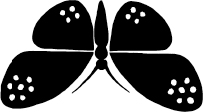
CANONGATE BOOKS
EDINBURGH 2019

biblio notice
This revised edition published in
Great Britain, the USA and
Canada in 2019 by Canongate
Books Ltd, 14 High Street,
Edinburgh EH1 1TE
Distributed in the USA by Publishers Group West
and in Canada by Publishers Group Canada
canongate.co.uk
This digital edition first published in 2018 by Canongate Books
Copyright Alasdair Gray 2014, 2019
The moral right of the author has been asserted
The author gratefully acknowledges the support of
Creative Scotland towards the publication of this book

British Library Cataloguing-in-Publication Data
A catalogue record for this book is available on
request from the British Library
ISBN 978 1 78689 520 2
eISBN 978 1 78689 521 9
an epigraph

Everyone over middle age
regrets some loss that ageing brings.
My principal regret is this:
Ive never tackled handy things.
Before King Louis lost his head
his hobby was repairing locks.
Byron, despite a crippled foot,
wrote epics yet could swim and box.
Sir Thomas Browne, Bill Carlos Bill,
were medical practitioners.
The Reverend Sydney Smith had skill
to doctor his parishioners.
One soldier wrote great words for tunes.
One housewife writes tremendous books.
One postman publishes cartoons.
One mural painter welds and cooks.
One sweeper of streets can etch and paint.
One banker played the bagpipes well.
One fisherman became a saint who
holds the keys of Heaven and Hell.
Ruskin swept stairs and weeded plots.
D. H. Lawrence scrubbed the floors.
Count Tolstoy emptied chamber pots.
Why do I flinch from household chores?
Frostss farming was not infamous.
Melville and Conrad sailed the sea.
James Kelman drove an omnibus.
No honest toil excuses me.
Hamish Henderson
Agnes Owens
Stuart Murray
Nichol Wheatley
Alan Richardson
Former manager of the Glasgow Byres Road Clydesdale Bank
Peter
TABLE OF CONTENTS
Foreword
M Y LAST BOOK WAS CALLED A Life in Pictures. This one might have been called A Life in Prose. It contains reminiscences and essays written between 1952 and 2014 about my own works and those of-friends. Marginal and footnotes give dates of writing or publication. The earliest piece is a speculative essay, apart from which the rest describe what I think facts, though readers will dismiss some as opinions. Three, though mainly factual, diverge into fiction for reasons the notes also explain. My life as a professional author connects most of them. I have improved a few sentences so that my younger self sometimes seems to write better than he did, but no other changes suggest I was wiser in those days than I am now.
I thought this book would turn out to be a ragbag of interesting scraps. I now think it has the unity of a struggle for a confident culture, a struggle shared with a few who became good friends and thousands I have never met. Every nation has periods of lesser and greater assurance. When I was twenty-one the Scotland I knew was confident in the many goods it made and exported, but many educated people had very little confidence in Scottish visual and literary art, not because we lacked them, but because our education had stopped us seeing them. I believed all good books by Scots must be published in London and would fail if not praised by English book reviewers; also that artists wishing to live by their art had better follow the example of Labour politicians and go to London. This explains the querulous tone of many early essays. I felt my nation was treated as a province, even by many who lived here. I wanted that to stop.
Being twelve years old when the 2nd World War ended, I belonged to the first generation to benefit by the welfare state in both healthcare and education. Unlike post-Thatcher children we had grants to attend art schools and universities without getting into debt, and even shift from one to another. From these pre-Thatcher graduates came poets, writers and playwrights who are now part of a very loose literary and artistic establishment at home in their own land, which may again become a nation in 2015.
A Socialist like my father, I loved Riddrie Public Library because it let anyone, but especially me, become a citizen in the worlds Republic of Letters. I referred so much to it in these essays that I have deleted most and other repetitions, filling the hole

Alison Lumsden, my sharpest critic, says my habit of forestalling antagonistic remarks in forewords is a cowardly ploy intended to baffle honest criticism. She is right. This ploy will get my work forgotten sooner rather than later.
Such as this.
.
Middle Age Self Portrait
Saltire Society was founded in 1936 by people who wished to see, not just a revivals of the arts of the past, but a renewal of the life that made them, such as achieved by Scots in the 18th century. It publicized new buildings, good restorations of old ones, while issuing pamphlets on Scots history, law, philosophy, famous writers, usually dead. In the 1980s it started printing autobiographical booklets about modern authors. MacDiarmid & Goodsir Smith were dead, so theirs were edited out of their personal accounts still in print. Naomi Mitchison and I wrote our own. Mine, published in 1988, was last of a series which should have continued while any Scots knew they had a literature.
O N MONDAY, 18TH MAY, 1987, 10.30 PM. My birth certificate says I am 52 years, 167 days, 40 minutes old. My passport says I am 1.74 metres or 5 feet 9! inches tall. According to the scales in the lavatory I weigh 13 stones and 7 pounds in my socks, semmit, underpants, bath robe, national health spectacles and false upper teeth: from all of which a doctor will deduce I am not in the best of health. I have the lean, muscular legs and small bum of the brisk pedestrian but the bulging paunch of the heavy drinker, the fleshy shoulders hunched too near the ears of the asthmatic with bronchial tendencies. The neck is thick; hands and feet and genitals small; the chin strong and double with the underside not yet grossly pendulous; the moustache pale sand colour; the straight nose survives from the years when I was thin all over; the eyes are small and sunken with blue-grey irises; the brow straight and not deeply lined; the hair of the scalp is fading from nondescript brown to nondescript grey and thinning behind a slightly eroded scalp-line. In repose the expression of the face is as glum as that of most adults. In conversation it is animated and friendly, perhaps too friendly. I usually have the over-eager manner of one who fears to be disliked. When talking freely I laugh often and loudly without being aware of it. My voice (I judge from tape-recordings) is naturally quick and light, but grows firm and penetrating when describing a clear idea or recollection: otherwise it stammers and hesitates a lot because I am usually reflecting on the words I use and seeking to improve and correct them. When I notice I am saying something glib, naive, pompous, too erudite, too optimistic, or too insanely grim I try to disarm criticism by switching my midland Scottish accent to a phony form of Cockney, Irish, Oxbridge, German, American or even Scottish.

